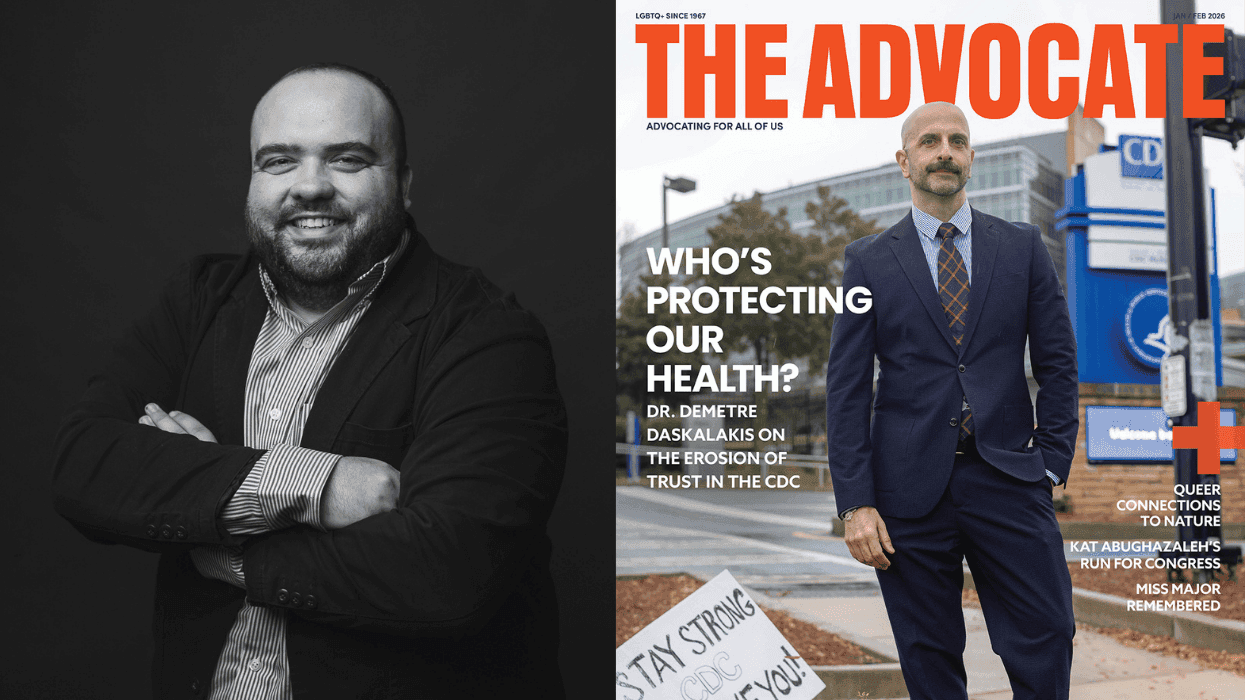Melissa Etheridge had just rolled into New York City on her tour bus Sunday morning when she heard the news about Orlando. Like most LGBT people, she instantly felt helpless and uneasy.
"I found myself roaming around my apartment," she tells The Advocate. After spending too much time staring at the nearby Freedom Tower, she picked up her guitar. "I knew that would make me feel better, and I just started writing."
The result is "Pulse," a rousing testament to humanity and love overcoming hate. In the song, Etheridge sings, "I dream in a world that wants my soul / That tells me if I hate I can control / But I don't believe it / I cannot conceive it / Because everybody has a pulse."
It's earnest but beautiful; steadfastly positive against all odds.
"Once again I hang my head to cry / I can't find a reason why they died / We will find the answer / Blowin' in the wind."
"Pulse" was initially going to be a darker song, with mentions of past mass shootings. Etheridge scrapped that idea when the list of tragedies grew too long and instead opted for a different approach. The final song focused on how something like the Pulse nightclub shooting can remind disparate people of our universal humanity.
"I get so moved by so many things, not just the sadness of tragedy," the Grammy-winning singer and longtime advocate says. "I also get moved by how we react. Unfortunately, it takes a hideous event like this, but sometimes it brings people together and moves others who might have been like, 'That gay thing is not anything I'm concerned about.' It moves them and they think, I have to stand on the side of love and peace."
Like her Oscar-winning song "I Have to Wake Up" from 2007's An Inconvenient Truth, "Pulse" is a perfectly timed anthem. After Etheridge wrote and recorded the song, she discovered that one of the queer women who died in the shooting, beloved Pulse bouncer Kimberly Morris, hailed from the city she was just about to perform in.
At Wednesday's night emotional show at Torrington, Conn.'s historic Warner Theater, Etheridge dedicated "Pulse" to Morris who, 20 years ago, played basketball at the high school up the road. After leaving Torrington, Morris moved to Provincetown, Mass., and then Hawaii. To care for her mother and grandmother, Morris moved to Orlando just two months ago and had been working at Pulse for a few weeks when Omar Mateen killed 49 people there, including, as she was affectionately known, K.J.
"I'm going to do the song tonight solo and I will absolutely dedicate to her," Etheridge says. "This is her town."
The performance was filmed for the live public television concert series Infinity Hall Live. See it below.
The single will go on sale soon (hear it here) and the proceeds of "Pulse" will benefit Equality Florida. Etheridge is doing her part, but she's frustrated more can't be done. She laments the "stonewalling" of change by a Republican-dominated Congress.
"I've never been one to really, really push on gun control ... [but] you can probably ban a gun that's made to kill many people. Let's start with that."
Beyond gun control, we must make homosexuality less furtive, less alien, Etheridge says. Otherwise, in cultures and religions where LGBT people are not discussed, or are regularly talked about with scorn, fear festers.
"It's the normalizing [of homosexuality]," Etheridge says. "It's what's been the fear all along; [homosexuality] is going to be normal! Yes, it needs to be. It's our own that have been forced to not be who they are and to hate that part of themselves. You're going to breed a killer; someone who can't stand the pain inside of themselves so they have to do damage outside."
Now is the time to talk and support and encourage others out of the closet, Etheridge says, not assign blame to certain groups.
"Yes, [Mateen] was an Islamic extremist -- I don't know how extreme, pretty fundamental, I imagine -- and it could have been a fundmentalist Christian. It's the same hatred, the same fear of sexuality and fear of the feminine."
With "Pulse," Etheridge didn't want to perpetuate more fear and resentment. "I couldn't make it 'us against them,'" she says. "I had to say it's all of us together and we have to find a way to heal."
















Charlie Kirk DID say stoning gay people was the 'perfect law' — and these other heinous quotes
These are some of his worst comments about LGBTQ+ people made by Charlie Kirk.